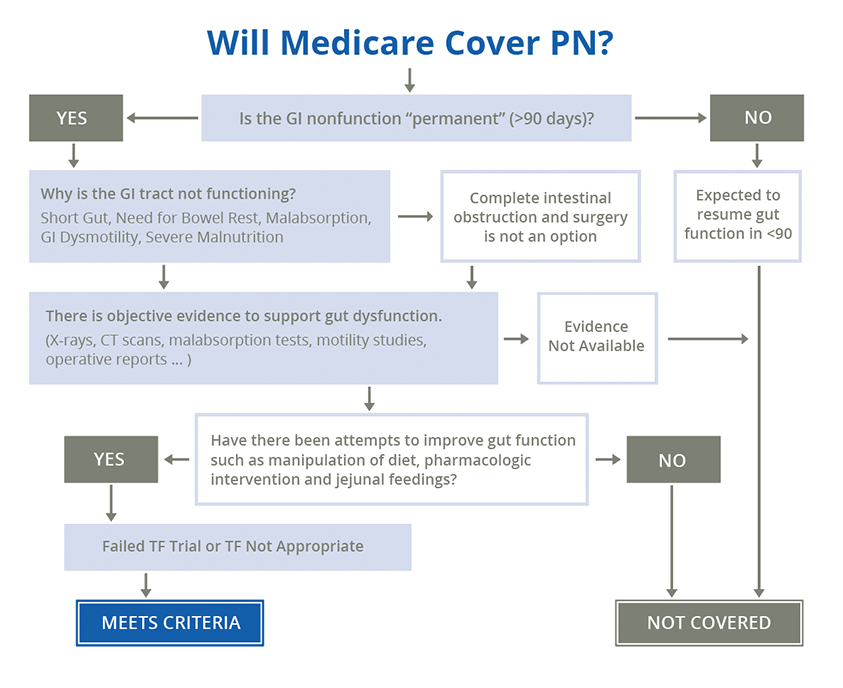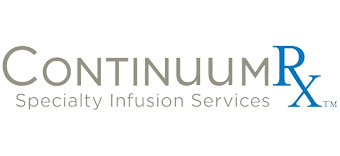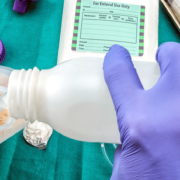On average, approximately 34,000 patients in the United States receive parenteral nutrition (PN) each year1 for critical ailments. For patients 65+ who are on Medicare, the worst news that a physician or case manager has to deliver is, “I’m sorry, you don’t meet the Medicare criteria for home parenteral nutrition.”
For over 20 years, parenteral nutrition has fallen under the prosthetic device benefit under Medicare Part B. There are seven gastrointestinal conditions (GI) that are considered by Medicare before providing coverage. And when it can be proven that a patient permanently (beyond three months) cannot absorb nutrients that are needed to maintain their weight and strength, is when Medicare may cover the accessories or supplies that are needed for long-term home infusion therapy. Patients with short bowel syndrome, GI fistulas, bowel obstructions, acute pancreatitis, and/or nutritional complications from cancer are typical candidates. It goes without saying that the nutritional mix of protein, carbohydrate, fat, minerals and electrolytes, vitamins and other trace elements and are received through parenteral nutrition can reduce complications, and even more so, reduce the risk of rehospitalization. As a result, regardless of insurance coverage or not, if there is any possibility that a patient may require parenteral nutrition (PN) at home after being discharged, the planning and documentation process needs to start immediately. By starting right away, it ensures that the physician, case manager, infusion provider, as well as the patient, are aware of what is required to attempt to secure coverage.
Understanding what Medicare covers and does not cover will ensure speed, efficiency, and uninterrupted quality of care on behalf of the patient. Utilize and implement the guidelines and quick-reference chart below to maximize effectiveness.
Medicare Does Not Cover Parenteral Nutrition For
Patients with a functioning gastrointestinal tract whose need for parenteral nutrition is only due to any of the following conditions:
- Swallowing disorder
- Temporary defect in gastric emptying such as a metabolic or electrolyte disorder
- Psychological disorder impairing food intake such as depression
- Metabolic disorder inducing anorexia such as cancer
- Physical disorder impairing food intake such as the dyspnea of severe pulmonary or cardiac disease
- Side effect of a medication
- Renal failure or dialysis
Medicare DOES Cover Parenteral Nutrition
(Parenteral Nutrition is approved on an individual, case-by-case basis initially and at periodic intervals of no more than three months by a Medicare Administrative Contractor (A/B MAC (B)) medical consultant or specially trained staff. It is expected that the patient’s medical records will reflect the need for the care provided. These records are not routinely submitted but must be available upon request.)

7 Gastrointestinal Conditions for Medicare Consideration
- Severe Short Bowel Resection: Surgery within the past three months, leaving less than 5 feet of small bowel beyond the ligament of the Treitz.
- Severe Short Bowel Syndrome: The patient has a short bowel syndrome that is severe enough that the patient has significant gastrointestinal fluid and electrolyte malabsorption.
- Bowel Rest for at Least 3 Months: The patient requires bowel rest for at least three months for treatment of:
- Symptomatic pancreatitis with/without pancreatic pseudocyst
- Severe exacerbation of regional enteritis
- A proximal enterocutaneous fistula where tube feeding distal to the fistula isn’t possible.
- Complete Mechanical Small Bowel Obstruction: The patient has complete mechanical small bowel obstruction where surgery is not an option.
- Malabsorption and Malnutrition: The patient is significantly malnourished (10% weight loss over three months or less and serum albumin less than or equal to 3.4 gm/dl) and has severe fat malabsorption.
- Motility Disturbance and Malnutrition: The patient is significantly malnourished (10% weight loss over 3 months or less and serum albumin less than or equal to 3.4 gm/dl) and has severe motility disturbance of the small intestine or stomach which is unresponsive to prokinetic medication.
- Malnourished and Proven Condition: The patient is malnourished (10% weight loss over three months or less serum albumin less than or equal to 3.4 gm/dl) and disease and the clinical condition has been documented as being present and it has not responded to altering the manner of delivery of appropriate nutrients (e.g., slow infusion of nutrients through a tube with the tip located in the stomach or jejunum).
The information provided is meant to be a guide for your information only. Each health care provider’s office is responsible for providing accurate information to ContinuumRx for verifying codes, coverage and payment policies used for individual patients to ensure that they are exact and appropriate for the services and items provided.
Contact a ContinuumRx Medicare qualifying expert or trained clinician to assess your patient’s eligibility.
1 Trends in Parenteral Nutrition, By Kristi L. King, MPH, RDN, CNSC, LD, Today’s Dietitian Vol. 21, No. 1, P. 36, January 2019.










Leave a Reply
Want to join the discussion?Feel free to contribute!